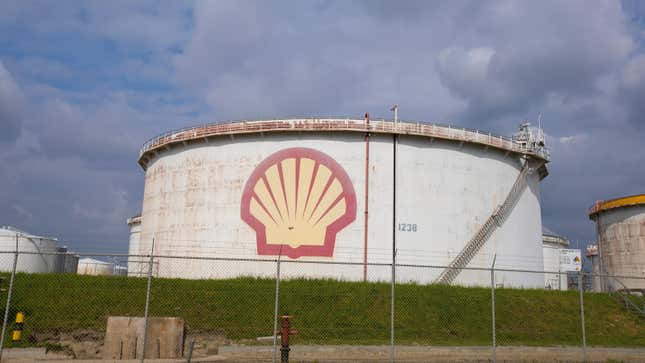
Royal Dutch Shell on Monday said it was selling off all of its oil and gas assets in Texas’s Permian Basin for $9.5 billion in cash to ConocoPhillips, one of the biggest recent transactions in the industry.
The sale represents 225,000 net acres of land in the Permian that produces 175,000 barrels of fuel per day, the companies said in a news release; a Shell executive told the Wall Street Journal that its employees in the Permian would join ConocoPhillips. After the sale is complete, Shell will have no remaining presence in onshore production in the Permian, one of the world’s largest oil and gas producing fields.
While Shell’s announcement makes no mention of its climate or energy plans, the sale comes as Shell and other oil companies come under increasing scrutiny from climate activists and the general public for their plans to cut emissions. Shell, in particular, is facing a historic legal challenge to its business: in May, a stunning ruling from a court in the Netherlands ordered Shell to cut its emissions 45% by 2030, in line with what the Paris Agreement mandates. (The company has said it will challenge the ruling, with CEO Ben van Beurden penning a LinkedIn post to explain the reasoning.)
Shell has also faced a flurry of other legal challenges in the Netherlands and the U.S. over its climate commitments. Earlier this month, another Dutch court (the Dutch legal system is really pulling its weight here) ruled that Shell needed to stop using advertisements that claim that customers can make their purchases “carbon neutral” if they buy offsets at the pump. (This is a campaign that Shell also hired Instagram influencers to promote.) And last week, the U.S. House of Representatives said it was launching an investigation into Big Oil’s use of misinformation, calling representatives from major oil firms to testify, including Shell.
The sale could be read as a sign that the industry is slowly recognizing that fossil fuels may not be a cash cow forever. The Shell executive told the Journal that the decision to sell came after the company considered acquiring new assets in the Permian, but ultimately decided that the most profitable move for shareholders would be to sell. Shell has indicated that it seems to recognize the writing on the wall when it comes to fossil fuels: Earlier this year, the company said in a statement that it had reached peak oil production in 2019, peak emissions in 2018, and its fossil fuel production would gradually start to decrease (albeit at a rate far, far slower than what the Dutch court has ruled and what science dictates). Van Beurden also said in May that the company is “absolutely needed” for the energy transition and that people will see Shell “do the right thing.” OK, Ben!
The Permian deal also show that oil and gas executives are worried about climate respectability in the business arena. (TBD on the actual climate.)
“Shell doesn’t want to sell to someone who is going to make them look bad on their ESG metrics even after the sale,” oil and gas analyst Subash Chandra told the Journal. “It used to be, ‘Just show me the money.’”
The press release notes that Shell’s Permian assets have, over the past four years, “reduced greenhouse gas and methane intensity by 80% through investment in infrastructure and technology.” Chandra noted to the Journal that as part of the sale, ConocoPhillips agreed to up its target to reduce emissions intensity by 2030, even as they’re acquiring all this new dirty fuel production. Sounds nice, but emissions intensity is basically a trash metric that allows companies to keep increasing emissions while sounding like they’re doing good on paper.
What’s really happening is that Shell is offloading a huge amount of fossil fuel production to another company that’s simply going to keep drilling. Shell’s books may look cleaner, this Permian sale is, when it comes to net total global emissions… a shell game. (Earther managing editor Brian Kahn would like credit for that incredible pun, so please email him directly with your feelings about it at brian.kahn@earther.com.)
It illustrates one of the key problems with putting trust only in market forces to right the ship when it comes to climate change: Pressuring companies to clean up their emissions can only go so far. Without other forces acting to restrict all fossil fuel production and use, a company facing pressure to lower its emissions can just sell off some assets to the highest bidder —some of whom won’t care about global opinion as long as oil and gas keep earning money. The Saudi government, for one, has indicated that they don’t really give a shit about other countries turning away from fossil fuels or the climate risks, and are planning to drill, baby, drill for decades to come.
Still, it’s encouraging to see a company as big as Shell running scared—and illustrates that market and legal pressure is good for something. It’s not the be-all, end-all solution to ending fossil fuel production, but it’s still progress in forcing some of the biggest historic polluters to envision different futures for themselves if they want to stay relevant. Keep on bullying fossil fuel companies—let’s see what else happens.